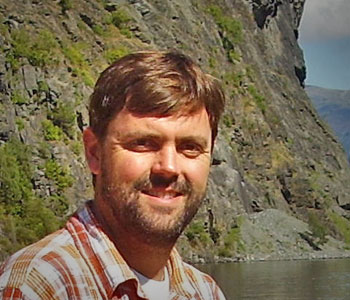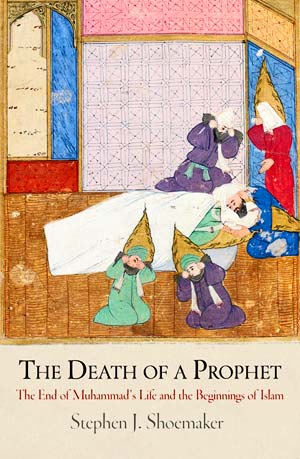
This book is an effort at the “quest for the historical Muhammad” that uses methods and perspectives borrowed from biblical and early Christian studies to investigate the beginnings of Islam. It takes its main focus on divergent traditions about the timing of Muhammad’s death in the historical sources for the early Islamic period.
The traditional Islamic biographies of Muhammad, which were first written more than a century after his death, relate Muhammad’s death in 632 at Medina. Nevertheless, an alternative tradition survives in earlier and more numerous Jewish, Christian, Samaritan, and even Islamic sources, in which Muhammad was still alive when his followers entered Palestine in 634-35. Although this discrepancy in the source materials has been known for several decades, until now, it had never been investigated.
The purpose of this study, however, is not to determine when Muhammad really died. Rather, these rival memories of the end of Muhammad’s life afford a valuable opening through which to explore the nature of earliest Islam more broadly.
The tradition of Muhammad’s leadership of the campaign in Palestine seems to be earlier than the account of his death in Medina. The question then is what developments within early Islam could explain such a transformation in the early Islamic memory of the conclusion to Muhammad’s life. This study argues that the basis for such “re-remembering” of Muhammad’s death lies in the rapidly changing nature of the new religious movement that he founded. Evidence suggests earliest Islam to have been driven largely by belief that the end of the world had drawn very near: Muhammad and his followers seem to have expected this event even within their lifetimes. The final judgment of “the Hour” was anticipated, it would appear, in Jerusalem, as it largely still is today in the Islamic tradition.
Accordingly, Jerusalem and the biblical Holy Land were of enormous religious significance for Muhammad and his earliest followers, vestiges of which can still be found in the Islamic tradition today. There is in fact mounting evidence that Jerusalem and Palestine were at least as significant as Mecca and Medina—if not perhaps even more so—in early Islamic sacred geography. Such a configuration would favor a memory of Muhammad’s association with the invasion of Palestine, as he led his followers to meet the final judgment in the Holy Land that was their promised inheritance as children of Abraham.
Nevertheless, Muhammad’s followers soon grew more patient regarding the end of the world and also developed a distinctive sacred geography that significantly diminished the status of Jerusalem to focus instead on the western Arabian Peninsula. Consequently, a new tradition of Muhammad’s death in this uniquely Islamic “Holy Land” was required. In such a way then, one can imagine the emergence of a tradition that remembered Muhammad’s death in his own sacred city, Medina, in parallel with these other developments in earliest Islam.
I hope that readers will read the book with an open mind. As clichéd as that may sound, this is particularly a concern given the hostility that some scholars of early Islam have expressed toward prior studies of Islamic origins that use historical-critical methods on traditional materials and approach the traditional Islamic narrative of its origins with a significant measure of skepticism. Indeed, in comparison with other areas of religious studies, the occasional but persistent antagonism to these kinds of approaches from some scholars in Islamic studies is unusual and unfortunate.
One of the main goals of this book is to narrow the divide that exists between the study of religion in the late ancient Mediterranean and the study of Islamic origins. Surprising as it is, there is still little scholarly activity across this divide, despite some notable recent achievements.
The beginnings of Islam have long been studied in relative isolation from the religious history of the late ancient Near East. Its study has proceeded almost exclusively on the basis of materials drawn from the Islamic tradition, and its formation has been conceived within the relative isolation of western Arabia, about which we know precious little during the pre-Islamic period outside of much later Islamic accounts. Little attention has been paid to how Islam may have developed into its classical form through a process of dialogue and interaction with the other religions of the seventh-century Near East.
The value of contemporary non-Islamic sources as evidence for the beginnings of Islam also needs to be taken more seriously. And it is not only the case that these sources need to be studied for what they relate about early Islam, but the possibility of significant development within the Islamic tradition after sustained contact with these other religious also needs to be more fully considered.
The book also addresses the need to bridge the study of Islam methodologically with these other Near Eastern religious traditions. Many scholars of early Islam have long taken the witness of the Islamic historical tradition more or less at face value, despite widely acknowledged problems with these sources. The traditional narratives of Islamic origins were very late in forming—over a century after the events in question—and they are widely recognized as presenting a highly idealized portrait of Muhammad and the beginnings of Islam that seems designed to embody the beliefs and practices of Islam during its second and later centuries. Similar problems also beset the study of Christian and Jewish origins, but scholars in these fields have learned to treat the relevant sources with a healthy dose of skepticism. They have also developed methods for reconstructing various models of early Judaism and Christianity despite the tendentious nature of the sources. These approaches also hold potential to shed new light on the beginnings of the Islamic tradition.
I began along the path to this book many years ago, back in graduate school actually. The focus of my training was on Christianity in the late ancient and early medieval Near East, but one of my good friends was an Islamicist who had initially started out in the history of Christianity. We often discussed the differences in approach to studying the origins of the two traditions, and especially the relative absence of the “hermeneutics of suspicion” from study of early Islam. This same friend first introduced me to a book by Patricia Crone and Michael Cook, Hagarism, a highly provocative and controversial study of formative Islam based on the non-Islamic sources. This was the first work to identify the discrepancy in the sources concerning the timing of Muhammad’s death. I was struck by the quality of the evidence for this tradition, particularly its “multiple, independent attestation” in a variety of sources: such evidence is the “gold standard” of historical Jesus studies. I initially intended to write a brief article noting the apparent quality of this evidence when viewed from another discipline. But the article grew, and before long, I realized that I was writing a book.
The introduction will give readers the best overview of the issues and questions that the book engages, as well as its broader intellectual context. Nevertheless, I attempted to write the book so that each of its four chapters could be read largely on its own.
For some readers the most interesting material may be in the third chapter, which deals with the question of imminent eschatology in earliest Islam, that is, belief that the end of the world was very near at hand. This topic raises fundamental questions about the nature of primitive Islam and its religious outlook and invites considerable suspicion regarding the traditional narratives of Islamic origins. It also challenges widely held contemporary views of Muhammad as primarily a social and economic reformer or the architect of a pan-Arab “nationalist” or “nativist” movement. Moreover, this investigation of early Islamic beliefs about the end of the world proceeds in a methodologically comparative fashion, drawing comparisons to study of the historical Jesus and primitive Christianity. This chapter thus will especially interest readers with expertise and interest in biblical studies or the comparative study of religion.
Some of my primary wishes for the book’s implications and consequences are implicit in the answer to your second set of questions. I hope that the book will spur further discussion about Islam’s development within the broader context of religion in the late ancient Near East. We need to examine the beginnings of the earliest Islamic tradition not as something that burst into the Mediterranean and Mesopotamian world already fully formed but instead as a phenomenon that continued to develop rapidly even after it entered these new milieux.
Likewise, I hope that this study might encourage more widespread incorporation of methods and perspectives from biblical studies to the study of formative Islam. Although scholars of early Islam have often resisted and even explicitly rejected the relevance of these approaches, they offer valuable new avenues for investigating the beginnings of Islam. This is particularly true for methods used in New Testament and historical Jesus studies, which have been largely ignored as models to this point, despite the fact that there are important similarities in the nature of the early Christian and Islamic materials.
By introducing historical-critical approaches developed in the study of Jewish and Christian origins we might achieve greater methodological and ultimately pedagogical unity within the discipline of religious studies.
The pedagogical implications, although often overlooked, are significant. Undergraduate textbooks regularly present accounts of early Judaism and early Christianity that are based on the critical discourses of scholarship that have developed around Jewish and Christian origins, and accordingly these differ significantly from the traditional accounts. The early history of Islam, by contrast, is generally presented largely according to the traditional Islamic view, despite the significant weaknesses of the relevant sources. As an educator, I think it would be helpful to present these traditions on a more consistent basis, and hopefully, more skeptical approaches to the early history of Islam can move us in this direction.


Stephen J. Shoemaker is Associate Professor of Religious Studies at the University of Oregon. He is a specialist on religion in the late ancient Near East and has published widely on Christian traditions about the Virgin Mary as well as on the beginnings of Islam. Besides The Death of a Prophet, featured on Rorotoko, he is also the author of Ancient Traditions of the Virgin Mary’s Dormition and Assumption (Oxford, 2002) and the translator of Maximus the Confessor: The Life of the Virgin (Yale, 2012).